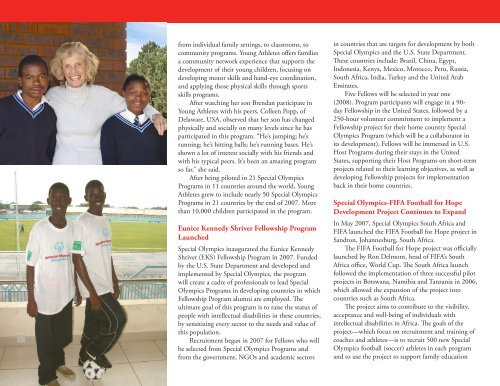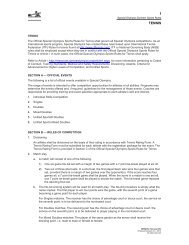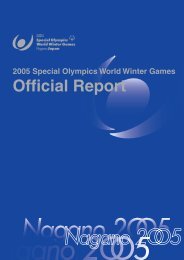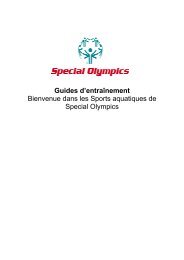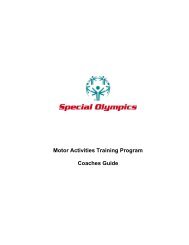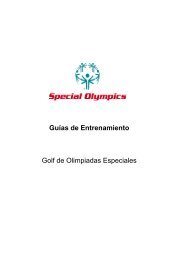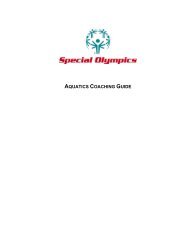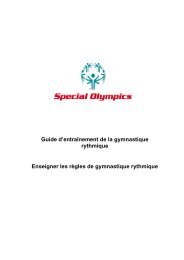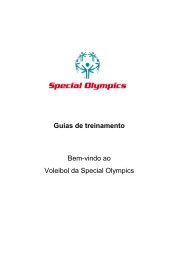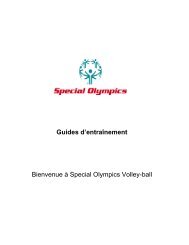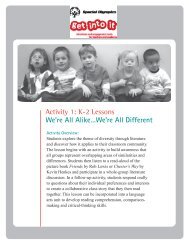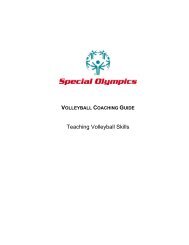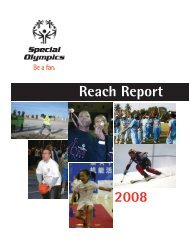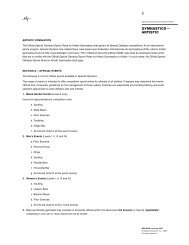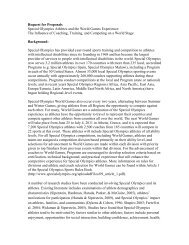2007 Annual Report - Special Olympics
2007 Annual Report - Special Olympics
2007 Annual Report - Special Olympics
Create successful ePaper yourself
Turn your PDF publications into a flip-book with our unique Google optimized e-Paper software.
from individual family settings, to classrooms, to<br />
community programs. Young Athletes offers families<br />
a community network experience that supports the<br />
development of their young children, focusing on<br />
developing motor skills and hand-eye coordination,<br />
and applying those physical skills through sports<br />
skills programs.<br />
After watching her son Brendan participate in<br />
Young Athletes with his peers, Colleen Popp, of<br />
Delaware, USA, observed that her son has changed<br />
physically and socially on many levels since he has<br />
participated in this program. “He’s jumping; he’s<br />
running; he’s hitting balls; he’s running bases. He’s<br />
shown a lot of interest socially with his friends and<br />
with his typical peers. It’s been an amazing program<br />
so far,” she said.<br />
After being piloted in 21 <strong>Special</strong> <strong>Olympics</strong><br />
Programs in 11 countries around the world, Young<br />
Athletes grew to include nearly 50 <strong>Special</strong> <strong>Olympics</strong><br />
Programs in 21 countries by the end of <strong>2007</strong>. More<br />
than 10,000 children participated in the program.<br />
Eunice Kennedy Shriver Fellowship Program<br />
Launched<br />
<strong>Special</strong> <strong>Olympics</strong> inaugurated the Eunice Kennedy<br />
Shriver (EKS) Fellowship Program in <strong>2007</strong>. Funded<br />
by the U.S. State Department and developed and<br />
implemented by <strong>Special</strong> <strong>Olympics</strong>, the program<br />
will create a cadre of professionals to lead <strong>Special</strong><br />
<strong>Olympics</strong> Programs in developing countries in which<br />
Fellowship Program alumni are employed. The<br />
ultimate goal of this program is to raise the status of<br />
people with intellectual disabilities in these countries,<br />
by sensitizing every sector to the needs and value of<br />
this population.<br />
Recruitment began in <strong>2007</strong> for Fellows who will<br />
be selected from <strong>Special</strong> <strong>Olympics</strong> Programs and<br />
from the government, NGOs and academic sectors<br />
in countries that are targets for development by both<br />
<strong>Special</strong> <strong>Olympics</strong> and the U.S. State Department.<br />
These countries include: Brazil, China, Egypt,<br />
Indonesia, Kenya, Mexico, Morocco, Peru, Russia,<br />
South Africa, India, Turkey and the United Arab<br />
Emirates.<br />
Five Fellows will be selected in year one<br />
(2008). Program participants will engage in a 90day<br />
Fellowship in the United States, followed by a<br />
250-hour volunteer commitment to implement a<br />
Fellowship project for their home country <strong>Special</strong><br />
<strong>Olympics</strong> Program (which will be a collaborator in<br />
its development). Fellows will be immersed in U.S.<br />
Host Programs during their stays in the United<br />
States, supporting their Host Programs on short-term<br />
projects related to their learning objectives, as well as<br />
developing Fellowship projects for implementation<br />
back in their home countries.<br />
<strong>Special</strong> <strong>Olympics</strong>-FIFA Football for Hope<br />
Development Project Continues to Expand<br />
In May <strong>2007</strong>, <strong>Special</strong> <strong>Olympics</strong> South Africa and<br />
FIFA launched the FIFA Football for Hope project in<br />
Sandton, Johannesburg, South Africa.<br />
The FIFA Football for Hope project was officially<br />
launched by Ron Delmont, head of FIFA’s South<br />
Africa office, World Cup. The South Africa launch<br />
followed the implementation of three successful pilot<br />
projects in Botswana, Namibia and Tanzania in 2006,<br />
which allowed the expansion of the project into<br />
countries such as South Africa.<br />
The project aims to contribute to the visibility,<br />
acceptance and well-being of individuals with<br />
intellectual disabilities in Africa. The goals of the<br />
project—which focus on recruitment and training of<br />
coaches and athletes—is to recruit 500 new <strong>Special</strong><br />
<strong>Olympics</strong> football (soccer) athletes in each program<br />
and to use the project to support family education


